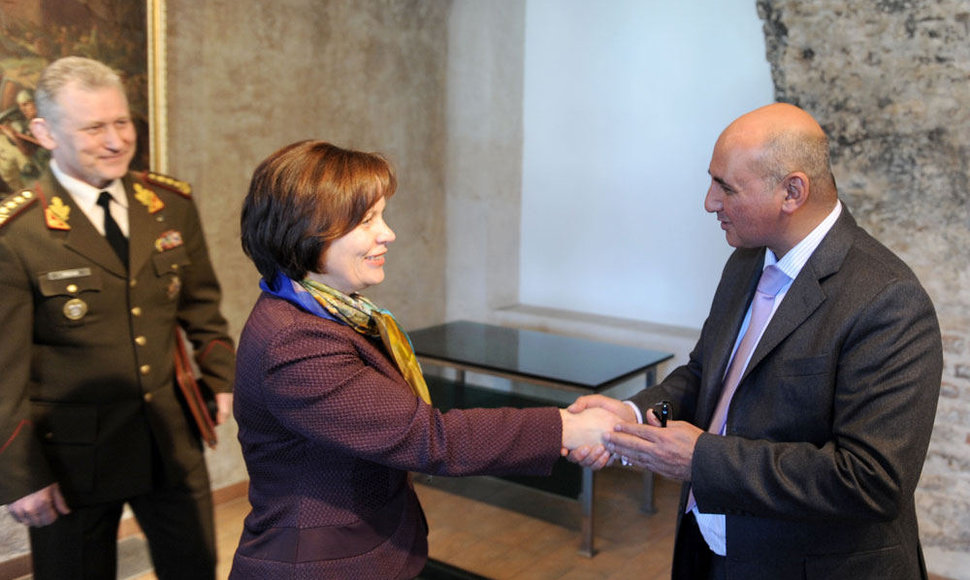Haiwad, who governs the province of Ghor where Lithuanian troops are heading the Provincial Reconstruction Team (PRT) since December 2010, has had to wait for two months before his holiday application was approved. “And now, out of 20 days of my holiday, I'm spending two here,” he says.
On his way to London, where his children live and study, Governor Haiwad came to Vilnius to meet with Lithuania's officials, “to check out the atmosphere.” The Governor's message was optimistic – the transition in the province is going smoothly and Lithuanian troops, that are scheduled to leave Ghor in 2013, are successfully handing over control to local administration. Chaghcharan, the capital of Ghor province, was included into the second stage of handover of security responsibility last autumn, and local authorities managed "very smoothly," according to him. Haiwad hopes the third stage, when responsibility for the remaining provincial territory will be handed over, will be equally successful. It is believed the launch of the third stage will be announced in May.
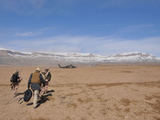 |
| Jurgio Stanaičio nuotr./Lithuanian troops in Ghor province |
Haiwad's visit to Vilnius takes place in the background of rather grim recent developments in Afghanistan. Frictions between local population and international troops have recently hit headlines with a series of incidents. One of them included outrage over a video of US soldiers urinating on dead Afghan captives. Later, an accidental burning of the Koran at an American base prompted riots and gunfights. And then, only weeks ago, a US soldier went on a shooting rampage, killing 16 Afghan civilians.
Last week, in a move that many commentators believe was intended to appease local groups weary of Western presence in the country, President Karzai hinted that international combat forces should withdraw from the country in 2013, instead of the late 2014 deadline that was agreed upon in Bonn last December.
Is it possible for the International Security Assistance Force (ISAF) to leave Afghanistan to itself so soon?
“It depends on the province,” says Abdullah Haiwad. “Obviously, if the President is asking for
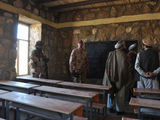 |
| Jurgio Stanaičio nuotr./Lithuanian troops in Ghor province |
some of the international forces to leave Afghanistan, there are some provinces that are more peaceful and there's no longer need for them. [...] But definitely, it's all to do with security and in many of the provinces security is improving every day.”
As regards Ghor, “we have been one of the most peaceful provinces in Afghanistan,” says Haiwad, “and we are proud of that.”
- But is it still realistic that Lithuanians handle all charge to local authorities so soon?
- In terms of transition? Well, we already have local administration in hands of the locals. Provincial Reconstruction Teams (PRT), they help us in reconstruction and development of the province. Their resources and the resources of their partners are brought to work towards the development of the province.
The PRT are working in two ways. On the one hand, they are working on the development of Ghor province. They have their own projects, like building roads, they have an orphanage and they have many other projects in Ghor. On the other side, they are working on the security. They go on patrol with ANA (Afghan National Army) and ANP (Afghan National Police). We are happy that we've got them partnered rather than having international forces working by themselves. They are always consulting with us and conducting patrols with our forces. We don't have worries that Lithuanians will go into villages and do something without the permission or knowledge of the provincial government, the police, and the army.
- In general, is it a common problem that foreign troops go and cause trouble, like the recent tragic event with the US sergeant?
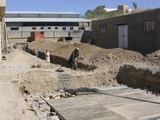 |
| URM nuotr./Hospital construction |
- In Ghor province, we do not encourage individual patrols, for the safety and security of international forces themselves. Also, we would like to create this partnership between local officials, local police, the ANA and the international forces, like the Lithuanians. So when there is cooperation, when they are working together, it's good for their trust and also partnership.
- What are the attitudes of simple Afghan people towards the Lithuanians?
- I can't say beyond one year and four months. There's a definite attitude. For now, Afghans understand that Lithuanians are here to help us and facilitate cooperation in terms of development. And they're not an occupying force, but a force helping the people of Ghor province.
- Do you think the mission has been successful in general?
- I think it's a successful mission and it has contributed massively towards the development of Ghor province.
- Were there any mistakes?
- Well, there are some mistakes that could be pinpointed, but, well, mistakes happen. Lithuanians are very cautious not to make any mistakes. Specifically, they are trying very hard not to play with people's sentiments. Also, they are not touching the religious side of things which is a very sensitive issue and people usually get really annoyed. Lithuanians are keeping away, they are showing respect for the Muslim religion and also the culture of the Afghan people.
***
The province that Nato forgot
Last August, correspondent Jerome Starkey of the Times published a report on Ghor province,
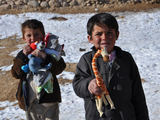 |
| Vyr. srž. Raimondo Sleževičiaus/PAG-14/KAM nuotr./Ghor |
painting a somewhat grimmer picture of the place. “It is a really tribal society,” he quotes Lithuanian Colonel Nerijus Stankevičius. “They have never had a central government. The local police, the local government officials, they don’t have much influence. Compared to five years ago … There are more unhappy people, more movement of Taliban fighters and more insurgent attacks.”
Ghor, the Times article concludes, is what the entire Afghanistan will look like once Nato forces withdraw – falling under the rule of local warlords that largely ignore official government. So much that some of them even set up checkpoints and tax the passing traffic.
- Do you agree with the Times assessment?
- Well, when he came to Ghor province, Jeremy headed for a place where there were two tribes at war. Recently, they have been separated from one another. They were still armed and settled to fight.
What we have in Ghor province are tribal issues. And tribal fights have been in Afghanistan for centuries, it's nothing new. When the international community and the international forces leave, we will have them again. At the time of king Zagir Shah, we had tribal feuds, at the time of Mahmud Khan, we had that too. If you go back, we had tribal feuds for hundred and hundreds of years. So it's nothing new. So Jeremy saw an armed man and he decided to write that Ghor province is controlled by warlords.
- Do you think the situation has improved even since last August?
- Yeah, last year we had fightings in five different areas. When I became the governor last year, we had fights in Pasaband, we had fights near Dawlat Yar, a government employee was shot by Taliban. Now we don't have any fight anywhere. I mean, there are tribes fighting, but there is no Taliban.
Women's rights
- In discussing Afghanistan, the issue of women's rights often comes up – both as a huge problem and an indication of progress.
- In a country that has been at war for thirty years and is also very deeply traditional, women's rights, children's right, human rights – these are things that need slow improvement. And it is improving in Ghor the same way as in the rest of the provinces. It is improving day by day, but if you want overnight changes – jumping from Taliban with human rights non-existent to European-style human or women's rights – this is not going to happen.
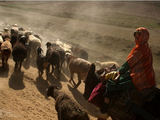 |
| Naseero Fedayee (Afganistanas) nuotr./Ghor province |
Or it will have a very adverse effect. Human rights have to complete a journey and become mature and then they will work for a long time. But if we try to implement everything overnight, it is going to have very bad side-effects.
- Do you feel there's a sincere will of the leadership to do it?
- Oh, definitely, there is. Everyone is trying. I opened a new secretariat in March for women only. I had a secretariat for men and then I separated a room for women so they can freely come to the governor's office. If they've got a complaint or an issue to discuss with me, they can come straight in and there's a woman who will deal with them and bring the matter to me.
That's a progress. We didn't have a women's secretariat before and I created it.
- What was it like before?
- Women just couldn't come. They would wait for days outside, but they were not allowed to come and talk to me.
What happened was that we held a program on women's rights and there was a woman who stood up and said: "I've been trying to come to you for seven months and I can't. My daughter has been taken away from me, kidnapped.”
Then I asked her to come to my office, I followed up with the case and, finally, her daughter came back home. So then I decided to have a secretariat for women, so they have access to me whenever they want. And they use it. They are new, they are shy, but they are slowly opening up.
***
Lithuania has led the Provincial Reconstruction Team in Ghor since 2005, and plans to withdraw in 2013. Around 150 Lithuanian troops are currently deployed in Ghor.
